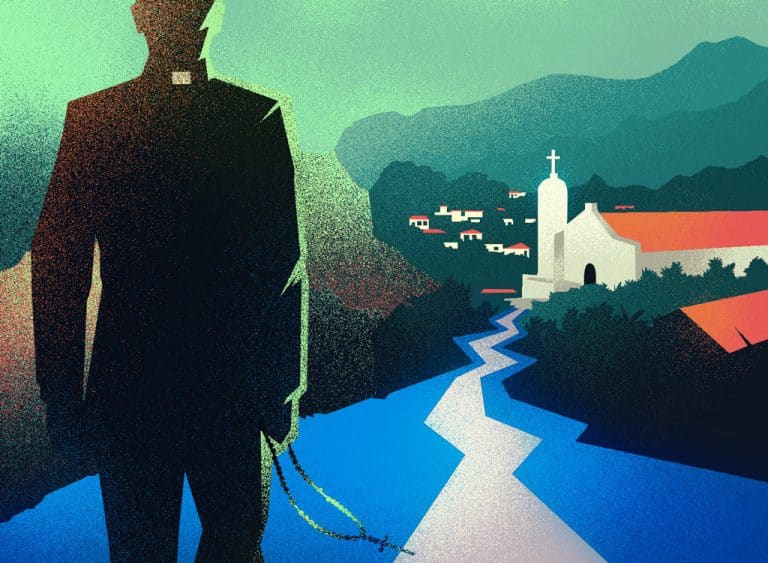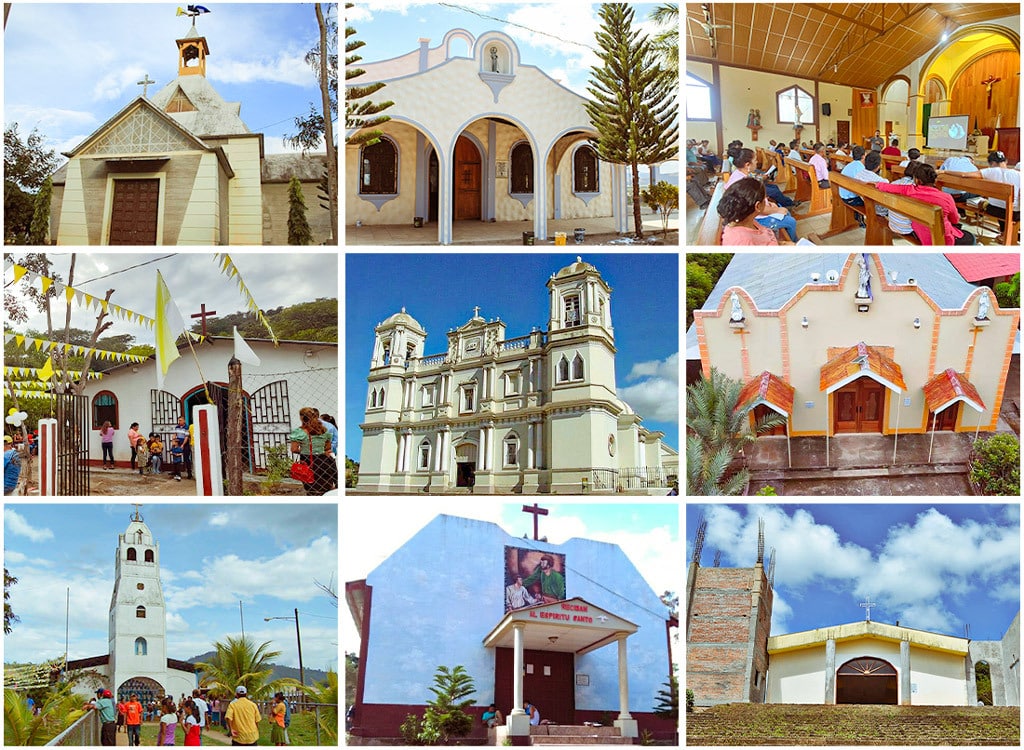23 de enero 2024

“NicaraguAmor” Cultural Caravan for Nicaraguans in the USA

PUBLICIDAD 1M
PUBLICIDAD 4D
PUBLICIDAD 5D
Matagalpa, Siuna, Bluefields, Estelí, and Managua parishes are among the most reduced. “Pastoral life is weakening,” warns exiled priest

Ilustración: Confidencial
Joel is Catholic and misses attending mass, including the celebration of baptisms and the administration of other sacraments in San Dionisio, department of Matagalpa, in northern Nicaragua. “It's very rare for a priest to come from another place to celebrate mass here,” he says regretfully. That parish was left without a priest a year ago, and is now only attended to by a deacon who celebrates the Word and distributes Communion, but does not have the authority to celebrate the Eucharist. The deacon only receives the consecrated formulas when a priest arrives in the parish, but increasingly fewer are available.
Faced with the persecution and attacks by the regime of Daniel Ortega and Rosario Murillo against the Catholic Church in Nicaragua, the priest of San Dionisio, Carlos Adolfo Zeledón Montenegro, fled in January 2023 and is now one of at least 97 priests who, since 2018, have been forced to leave Nicaragua by banishment, exile, expulsion, or because they were prevented from entering the country after traveling for studies, medical care, family visits, or religious events, such as World Youth Day.
There are also at least 13 deceased priests -including a bishop and a bishop emeritus- so the total loss, with data verified as of January 15, 2024, is 110 priests, which is equivalent to 20% of the total clergy registered as of 2020.
Along with the church of San Dionisio, which Joel attends, nine of 28 parishes in Matagalpa are without a pastor and are served by “emerging priests”: the Sanctuary of Jesus of Divine Mercy in Sébaco; San Francisco, in the municipality of Río Blanco; San Juan Pablo II, in Chagütillo, Sébaco; Santa Lucía, in Ciudad Darío; Nuestra Señora de Fátima, in Rancho Grande; and San José Obrero and Nuestra Señora de Lourdes, both in El Tuma-La Dalia. In addition, the parish of San Pedro Apóstol, whose main church is the cathedral of Matagalpa, was left without its two vicars.

The Diocese of Matagalpa has lost 25 of the 60 priests it had in 2020. That is almost 42%, and in most cases, it has been through imprisonment and banishment, or forced exile due to political persecution. Among them there are also four deceased priests; two who were studying and preferred to stay outside the country; and one who "hung up his habits" and left the priesthood.
Mosaico CSI verified the number of imprisonments and banishments of priests and documented first-hand testimonies of priests forced into exile, including some cases in which clergymen preferred to avoid publication.
The information was complemented with data from the study "Nicaragua, A persecuted Church?", by lawyer Martha Patricia Molina, and the report "Attacks on religious freedom with emphasis on aggressions against the Catholic community", by the Human Rights Collective Nicaragua Never Again (Colectivo de Derechos Humanos Nicaragua Nunca Más).
According to verified data, a total of 34 priests have been banished by the Ortega-Murillo regime. On February 9, 2023, five priests (along with a deacon and two seminarians) were banished and sent to the United States, among a total of 222 political prisoners, in the first mass banishment ordered by the Ortega regime. Then, on October 18 of the same year, another twelve arbitrarily imprisoned priests were banished and sent to the Vatican. A third group, composed of the bishops of Matagalpa, Rolando Alvarez, and Isidoro Mora, of Siuna, plus 15 priests and two seminarians were banished to the Vatican on January 13, 2024.
The Mosaico CSI team also verified that at least 37 Nicaraguan priests had to go into exile and seek refuge in different countries, such as the United States, Costa Rica, Chile, Italy, Honduras, and Spain. In addition, at least 21 more priests have been prevented from entering the country, and five foreign priests have been expelled from Nicaragua.
Prison, banishment, and exile have reached clergy and laity. In the first group of exiles, on February 9, 2023, were deacon Raúl Vega and seminarians Darvin Esteyling Leyva Mendoza and Melkin Antonio Centeno Sequeira. In addition, the laymen Manuel Obando, Wilberto Artola, and Sergio Cardenas, all collaborators of the Diocese of Matagalpa. And on January 13, seminarians Alester Sáenz and Tonny Palacio were banished.
Likewise, other lay people continue to be political prisoners of the regime because of their closeness to the Catholic Church. Among them, the group of collaborators of Caritas Esteli; the Matagalpan Freylin Axarael Moreno Ponce, political prisoner since June 2023, and Maria Asuncion Salgado and Salvador Paguaga, collaborators in the media of the parish of Our Lady of the Assumption, in Ocotal, Nueva Segovia, of the Diocese of Esteli, who were imprisoned in October 2023.
The Ecclesiastical Province of Nicaragua is composed of the Archdiocese of Managua and eight dioceses. According to the latest available records, as of 2020, 546 priests were serving 393 parishes in Nicaragua. Since then to date, there have been new priestly ordinations, such as the nine priests ordained by Cardinal Leopoldo José Brenes Solórzano on January 6, 2024, in Managua. However, the reduction of the Nicaraguan clergy due to the attacks of the regime is greater.
After Matagalpa, the dioceses that have lost the most priests are Siuna and Bluefields, where the number of priests decreased by 33% and 31%, respectively. Next, Estelí with a decrease of 28%, and the Archdiocese of Managua, with 25%.
"The heart of pastoral life in a parish is the celebration of the Holy Sacrifice at Mass...the one that dogmatically makes Christ present at the moment of consecration, and which allows the unity of the faithful with the Good Shepherd," says a priest under strict condition of anonymity. He adds that the lack of priests means that "there is also no sacrament of reconciliation, which is the one that allows souls to return to Communion with Christ and with the brethren".
Joel mainly misses the Masses on Thursdays and Sundays. These are the days of precept. "Father Carlos and Father Juan, who were cousins, were there, but one of them we did not know where he went, and the other one, they say he is in Costa Rica, so we are left without priests. Sometimes one also came to Susulí (a rural community) and the other one who came a few times was the one who was the vicar (Monsignor Óscar José Escoto), but they took him to the Vatican with the bishop (Álvarez) and we don't know how we are going to stay", explains Joel.
For Paola, from the city of Matagalpa, going to a church, going to confession, and listening to mass, gives her “the confidence that God will help me to discern and face in a better way the difficulties" that arise in her home, she says. “With a priest, one can talk and receive advice,” she says.
Juan, an exiled priest who asks not to be identified for fear of reprisals against his family, assures that this “accompaniment” or “spiritual direction of a pastor in the interior, personal and family life of the sheep, which sometimes comes from reconciliation, is lacking in the community without a priest, then the sheep are overwhelmed, without a shepherd".
"Nor is there the presence of the pastor to guide the Church's journey. There will be a deacon without experience and decision-making power in crucial matters, there will be a seminarian or a delegate of the Word, but that does not express the maturity and solidity of a good pastor. So pastoral life is weakened," laments Father Juan.
This article was published in Spanish in Confidencial and translated by our staff. To get the most relevant news from our English coverage delivered straight to your inbox, subscribe to The Dispatch.
PUBLICIDAD 3M
Medio de comunicación digital local independiente, con noticias, reportajes y perfiles sobre los departamentos de Matagalpa y Jinotega. Su labor ha sido reconocida con varios premios locales y nacionales a la excelencia periodística, entre ellos el Premio Nacional de Comunicación para los Derechos de la Niñez y Adolescencia, y el Premio Nacional María José Bravo.
PUBLICIDAD 3D